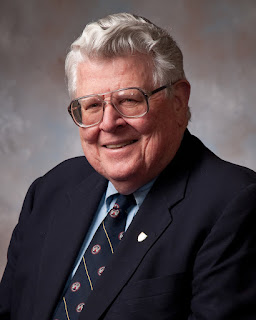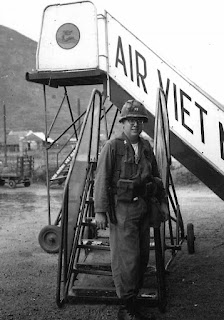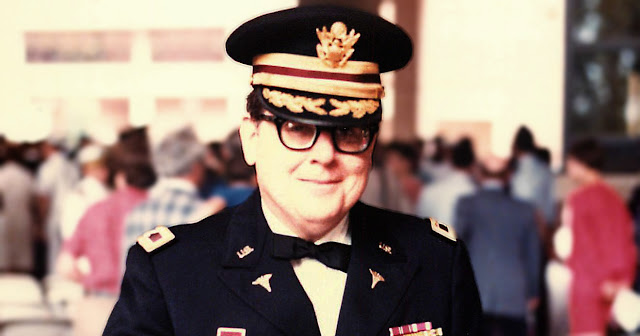Inspired by Mentors: USU’s First Surgery Chairman Receives AMSUS Lifetime Achievement Award
By Ian Neligh
Lifelong inspiration takes many forms.
For 88-year-old Dr. Norman Rich, the first and most influential mentor in his life came as a World War I veteran and physician who brought him into this world in 1934.
“In this small, Arizona mining town where we lived he was just known as ‘doctor,’” Rich says. “They didn’t even say his last name. He was my first hero, and I wanted to be just like him.”
Dr. Otto Utzinger not only inspired Rich to become a surgeon, but essentially helped plot the course of his groundbreaking career in medicine.
Today, Rich, a retired Army colonel, is known by many as a world-renown pioneer of modern vascular surgery.
The professor and Chair Emeritus of the Uniformed Services University of the Health Sciences (USU) Department of Surgery was selected as this year’s recipient of the prestigious Association of Military Surgeons of the United States (AMSUS) Lifetime Achievement Award for his extraordinary contributions to medicine. The award will be presented to Rich virtually on Feb. 24, 2022, during the AMSUS Annual Meeting.
 |
| Professor and Chair Emeritus of the USU Department of Surgery, Dr. Norman Rich, was selected as this year's recipient of the AMSUS Lifetime Achievement Award. (Photo credit: Tom Balfour, USU) |
One of those earliest supporters, Utzinger was a friend of his parents, and often shared with him his many stories of serving as a physician during the Great War.
“He went to France and served 18 months with the American Expeditionary Forces,” Rich says. “I grew up cutting my teeth on his World War I stories.”
Those stories would ultimately do more than entertain. One of his mentor’s greatest regrets, one that would have a profound impact on Rich’s career, was the sheer number of amputations Utzinger had to perform during the conflict.
“He thought I should devote my life not only to surgery but to repairing arteries, and blood vessels to lower the amputation rates,” Rich says. “So that was really what I followed — I never wavered from that.”
Rich says while attending Stanford University’s medical school he enjoyed learning all about medicine but focused on vascular trauma.
It was there he met his second mentor, Dr. Emile Frederic Holman, who was the last resident surgeon of the legendary Dr. William Stewart Halsted – considered by many as the “father of American surgery.”
Rich graduated medical school from Stanford in 1960 and five years later, after his surgical residency, he was commissioned in the Army. He became the chief of surgery at the 2nd Mobile Army Surgical Hospital (MASH) unit, where he created the Vietnam Vascular Registry in 1966, which has ultimately helped both military and civilian patients.
“I created a nucleus of people who thought as I did, who were very dedicated to doing what I was trying to do and together we created the Vietnam Vascular Registry and that was one of the hallmarks of my career,” Rich says. “I spent tens of thousands of hours — over 50 years — following up with the injured after the Vietnam War, following them through the VA system and into civilian life to see the outcomes of the types of repairs.”
The registry documented and analyzed injuries to blood vessels, documenting more than 10,000 injuries to get long-term information about the patients. Rich says he felt like he was the scribe for hundreds of young American surgeons who served in Vietnam.
“I personally met about 375 of them and kept up communications for a number of years…,” he says. “I always felt that I was the representative for the cadre of people who had the same mission, if you will, and that’s what is most satisfying to me.”
Rich says he eventually contacted about 600 American surgeons over the eight years of the war.
 |
| Retired Army Col. (Dr.) Norman Rich is recognized for his extraordinary contributions to medicine as the 2022 AMSUS Lifetime Achievement Award recipient. (Photo credit: Courtesy of Dr. Norman Rich) |
In time, he returned to Walter Reed Army Medical Center and helped train physicians deploying to Vietnam, while continuing his research. Rich became a USU professor in 1976 and the founding chairman of Surgery at the university the next year.
“I made sure I kept a whole group of mentors, if you will, because I had a hard time recruiting people to help me — so I leaned on friends and the people that I met and had support through their mentorship,” Rich says.
For more than 50 years, Rich has advanced treatments that spared many soldiers limb amputation or death.
“I came to Walter Reed for one year and never left,” Rich jokes. “I met so many people and had so many people who were willing to help me in what I was trying to do.”
Rich’s many awards and accomplishments also include everything from the Presidential Medallion from President Ronald Reagan in 1987 to the inaugural Distinguished Military Lifetime Achievement Award from the American College of Surgeons in 2019. He has lectured in more than 45 countries, written books, and hundreds of manuscripts. The American College of Surgeons named Rich an “Icon in Surgery” for his trailblazing work.
One doctor’s frustration at the limitations of World War I’s battlefield medicine led to another’s own lifelong dedication to improving those odds as a vascular surgeon, as mentorship at a young age inspired Rich to make an impact in the lives of countless others and helped to see his mentor’s hopes for a better future come true.





